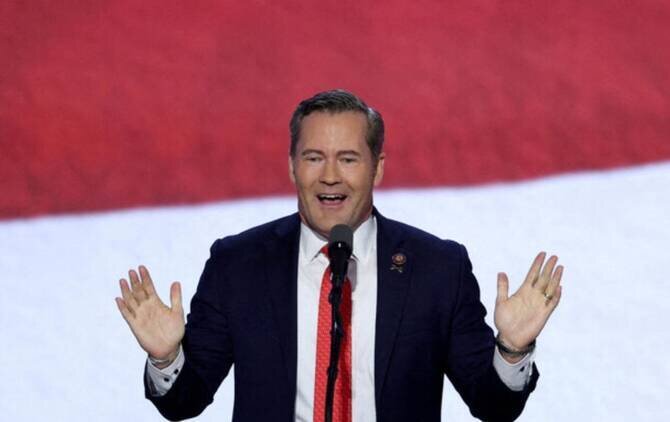
US Ambassador Mike Waltz and Trump Administration's UN Funding Strategy
The Trump administration is pursuing an 'a la carte' approach to its funding of the United Nations under Ambassador Mike Waltz.
UNITED NATIONS: The United States' new envoy to the United Nations, Mike Waltz, is adopting a stringent strategy towards UN funding as directed by President Donald Trump.
Waltz, formerly a Florida congressman, is taking a hard-line stance on how American taxpayer money is spent abroad.
Speaking at a virtual event hosted by the Richard Nixon Foundation, Waltz emphasized his 'America First' approach, stating that justifying the use of funds before local communities would be challenging in today's political climate.
He explained that as a result, the U.S. is leveraging its financial contributions to drive reform within the UN.
Waltz and other U.S. officials have been in discussions with UN Secretary-General António Guterres, advocating for an 'a la carte' method of funding where the U.S., historically the largest donor, selectively supports programs aligned with Trump's policy priorities.
This new approach marks a significant departure from previous administrations' engagement with the UN.
The shift has compelled the organization to undertake staff and program reductions amidst its ongoing internal reforms.
The UN is facing budget cuts proposed by Secretary-General Guterres, including an 18% cut in personnel and plans to repatriate 25% of peacekeeping forces worldwide.
The U.S. mission's demands include salary adjustments for certain high-ranking officials and the establishment of an independent inspector general to enhance financial transparency.
However, some UN agencies have been entirely disengaged from by the U.S., including the World Health Organization (WHO), UNRWA, and the Human Rights Council.
The moves are causing concern among global bodies and staff about potential further cuts, particularly regarding climate change and gender equality initiatives.
The pressure has led to a more austere budget proposal from Guterres, aiming for efficiency gains through reform.
UN peacekeeping operations are expected to face severe repercussions due to limited funding pledges by the U.S., resulting in the possible withdrawal of thousands of troops from various missions.
While Guterres acknowledges the relatively small impact on global military spending, he highlights UN peacekeeping's effectiveness and cost-efficiency in maintaining international security.
Analysts suggest that these changes signify a fundamental transformation in how the UN operates globally, with no other major nation ready to fill the financial gap left by the U.S. This could reduce the UN's capacity for on-ground operations, particularly in areas where the U.S. has traditionally played a leading role as a financial contributor.
Despite calls for the U.S. to withdraw from the UN altogether, Waltz and Trump maintain that there is potential value in maintaining a presence within the organization.
The U.S. is focusing on expanding its influence in standard-setting UN initiatives where it competes with China, such as the International Telecommunications Union, the International Maritime Organization, and the International Labor Organization.
Waltz asserts that while some may advocate for abandoning the UN, the world still requires a forum where all nations can engage, including adversaries like North Korea, Venezuela, Europe, Russia, and China.
The U.S. remains the largest contributor to the UN's budget, with China increasingly stepping in as a major funder.
Waltz, formerly a Florida congressman, is taking a hard-line stance on how American taxpayer money is spent abroad.
Speaking at a virtual event hosted by the Richard Nixon Foundation, Waltz emphasized his 'America First' approach, stating that justifying the use of funds before local communities would be challenging in today's political climate.
He explained that as a result, the U.S. is leveraging its financial contributions to drive reform within the UN.
Waltz and other U.S. officials have been in discussions with UN Secretary-General António Guterres, advocating for an 'a la carte' method of funding where the U.S., historically the largest donor, selectively supports programs aligned with Trump's policy priorities.
This new approach marks a significant departure from previous administrations' engagement with the UN.
The shift has compelled the organization to undertake staff and program reductions amidst its ongoing internal reforms.
The UN is facing budget cuts proposed by Secretary-General Guterres, including an 18% cut in personnel and plans to repatriate 25% of peacekeeping forces worldwide.
The U.S. mission's demands include salary adjustments for certain high-ranking officials and the establishment of an independent inspector general to enhance financial transparency.
However, some UN agencies have been entirely disengaged from by the U.S., including the World Health Organization (WHO), UNRWA, and the Human Rights Council.
The moves are causing concern among global bodies and staff about potential further cuts, particularly regarding climate change and gender equality initiatives.
The pressure has led to a more austere budget proposal from Guterres, aiming for efficiency gains through reform.
UN peacekeeping operations are expected to face severe repercussions due to limited funding pledges by the U.S., resulting in the possible withdrawal of thousands of troops from various missions.
While Guterres acknowledges the relatively small impact on global military spending, he highlights UN peacekeeping's effectiveness and cost-efficiency in maintaining international security.
Analysts suggest that these changes signify a fundamental transformation in how the UN operates globally, with no other major nation ready to fill the financial gap left by the U.S. This could reduce the UN's capacity for on-ground operations, particularly in areas where the U.S. has traditionally played a leading role as a financial contributor.
Despite calls for the U.S. to withdraw from the UN altogether, Waltz and Trump maintain that there is potential value in maintaining a presence within the organization.
The U.S. is focusing on expanding its influence in standard-setting UN initiatives where it competes with China, such as the International Telecommunications Union, the International Maritime Organization, and the International Labor Organization.
Waltz asserts that while some may advocate for abandoning the UN, the world still requires a forum where all nations can engage, including adversaries like North Korea, Venezuela, Europe, Russia, and China.
The U.S. remains the largest contributor to the UN's budget, with China increasingly stepping in as a major funder.